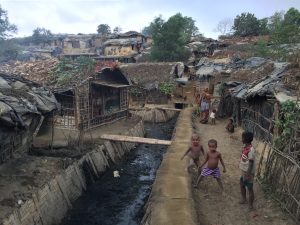Bangladesh has good reasons to refrain from taking a position on the February 1 coup in Myanmar, the country’s foreign minister told local media on February 3. It was the last official statement from Bangladesh after Myanmar following the military takeover.
After the coup happened in Myanmar, the Bangladeshi government was mainly concerned only with two things: the future of import of 100,000 metric tons of rice, and Rohingya repatriation.
Earlier in first week of February Finance Minister A. H. M. Mustafa Kamal told the press that the Bangladesh government had turned down a proposal to import rice from Myanmar due to the situation in the neighboring nation. But later the cabinet committee in charge of the decision changed its mind and said it approved the import of rice through a direct purchase method.
Meanwhile, the much-discussed Rohingya crisis went into deep freeze. Because of the coup, the long-awaited working committee meeting on Rohingya repatriation between Bangladesh and Myanmar, scheduled to take place on February 5, was deferred. But a Bangladeshi diplomat told to a local media outlet a new date for the director general-level talks will be fixed once the new interim military government in Myanmar becomes fully functional. However, the foreign minister has expressed hope about the situation, noting that the Rohingyas had been repatriated twice, in 1978 and 1992, under a military government in Myanmar.
However, the problem may be more complicated than that. Beijing and New Delhi are both competing for influence in Naypyidaw. Clearly China is far ahead in this race than India, but the role of the United Nations and international influencers matter too. Bangladesh’s plans to relocate a hundred thousand Rohingya refugees to Bhasan Char, an island in the Bay of Bengal, has also led to questions among many international rights groups, even though Dhaka has been ready with answers.
Beyond these lie more contentious issues. While Bangladesh does not publicly identify the Tatmadaw as a threat, its decision to build a 724-hectare cantonment in Cox’s Bazar near the Myanmar border and other military measures – including equipping border guards with air assets along with deploying electronic surveillance measures and all-terrain vehicles on the Myanmar border – all point to its increasingly cautious attitude when it comes to the Myanmar military.
The fact of the matter is that however the Bangladesh government seeks to eventually resolve the Rohingya crisis, and handle relations with its western neighbor more broadly, it is something that remains something of a mystery to Bangladeshi public.
Shakil Bin Mushtaq is a Bangladesh-born freelance journalist and analyst.

































